'Not a sacrifice, but a gift': Joy amid the struggle for mothers of children with intellectual disabilities
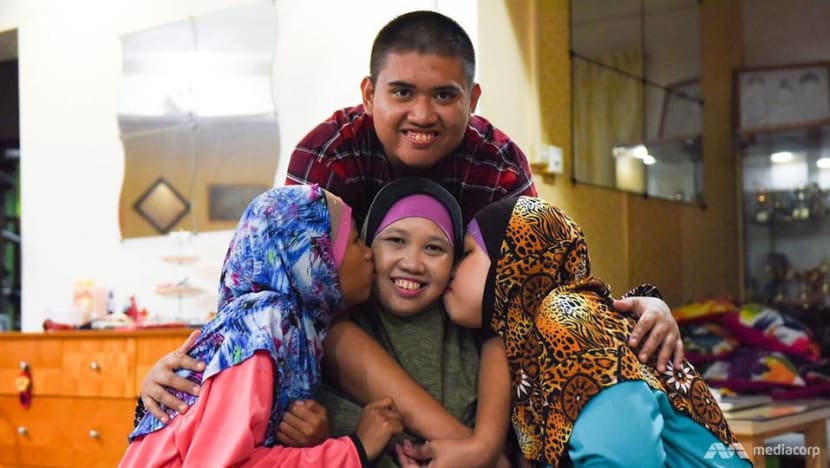
Mdm Rosmawati Rusli has three children with intellectual disabilities. (Photo: Matthew Mohan)
SINGAPORE: Rejected by schoolmates, ignored by relatives, misunderstood by teachers.
In a society so used to uniformity, Siti Nurhamizah was different.
"I had a friend who asked if there was any medicine to cure her 'sickness'," recalled Nurhamizah's mother, Mdm Rosmawati Rusli. "I said it's not a sickness, it’s something she has within her.
"Being a parent of three kids with special needs made me stronger to face whatever I had to face, especially when people judge me and my kids."
Along with her two siblings Muhammad Hakim, 19, and Siti Nurhazimah, 17, 21-year-old Nurhamizah has what is known as global development delay (GDD), a condition which can affect aspects of development such as cognitive, speech and motor skills.
While she is used to others labelling her children, Mdm Rosmawati prefers to define them differently.
“I told my husband: 'You’re not handsome, I’m not pretty, but our kids are perfect,'" said the 46-year-old mum.
Despite being born with mild cerebral palsy, Nurhamizah was a very active toddler, recalled her mother.
"She looked normal apart from her feet being curved slightly inwards," explained Mdm Rosmawati. "But I had a niece who was her age, the girl could talk well when she was two to three years old. Back then, my mother would complain and say that she would talk to my girl and get no response.
"We didn’t really panic yet but when beginning nursery, she still couldn’t talk well - her words were not clear."
Acting on the advice of the nursery's principal, Mdm Rosmawati sent Nurhamizah to a psychologist at KK Women's and Children's Hospital, where she was assessed to have GDD.
A BLESSING FROM GOD
Coming to terms with their child having an intellectual disability can be a struggle for mothers.
This was the case for Mdm Shankari Valareandan, when she found out her eldest daughter Priyadashani had mild intellectual disability which manifests itself in lower than average IQ and learning difficulties.
"It came to a point that I was coaching my child and she was failing," recalled the single mother of three. "She looked normal and was able to get instructions and carry out instructions - so why was this problem surfacing?
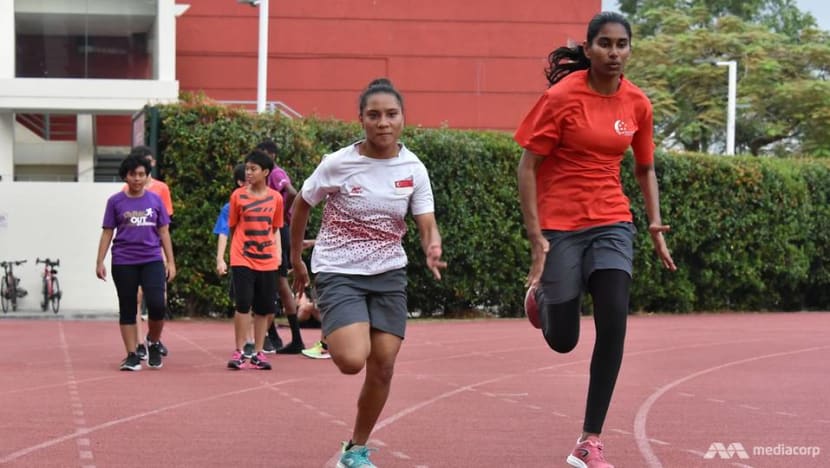
"When I met up with her teacher, she did advise me that it’s better to put her in a special education school," said Mdm Shankari.
"But as a mum from a typical Indian family, I was not able to accept it. I would just cry and feel totally down ... Priya was always my angel ... she was there during my hard times, she could understand my problems, why couldn’t I understand her problems? I couldn’t digest it."
It took a few months of careful research and close conversations with a friend who was a Special Education teacher for Mdm Shankari to come to terms with Priyadashani's condition.
After Priyadashani had completed PSLE, Mdm Shankari then enrolled her in special education school Grace Orchard.
On the other hand, the diagnosis of Nurhamizah's GDD did not faze the indomitable Mdm Rosmawati, who quit her job to look after her daughter full-time.
"I felt that God was blessing us by giving her to us," she said. "I had a new title as a mother. Certain things (like a job) you have to let go."
But it was also in a mainstream school where Mdm Rosmawati witnessed her daughter running into difficulties.
As Mdm Rosmawati couldn't send Nurhamizah to a school for children with special needs yet - it would not accept the girl till after completing nursery and kindergarten - she had to send her daughter to a mainstream school.
"One teacher told me off: 'Our school is expensive, you know your kid is special, why don’t you send her to a special education school?'" said Mdm Rosmawati.
"Some of the teachers kept on complaining, saying: 'Your kid cannot do this, cannot do that.' But even if the books were blank, I didn’t mind ... as long as she could learn to interact with others," she recalled.
But while Nurhamizah was happy to get to know her schoolmates, they were not as open to interacting with her.
"She wanted to mix around. I let her take the school bus and I saw her running here and there, wanting to join the kids when they played but they didn't let her join," said Mdm Rosmawati. "I felt sad but she is very strong. They pushed her away, but even the next day she still wanted to go to school.
"I learnt from her too."
READ: 'I need to represent Singapore even though my father couldn’t' - The para-athlete who chases her dreams and the dreams of others
NOT THE "SLIGHTEST" DISAPPOINTMENT
When her son Hakim also began to display signs of slower-than-normal motor skills, Mdm Rosmawati suspected that he too had GDD.
"When he walked, he would take his own sweet time," she recalled. "We brought him to the same psychologist - he was slower in terms of motor skills and speech as well as in understanding and catching up."
But what might have been a further blow to others only encouraged Mdm Rosmawati to press on with raising her children.
"It's not a sacrifice, but a gift to have them in my life. I might have been a very different person without them."
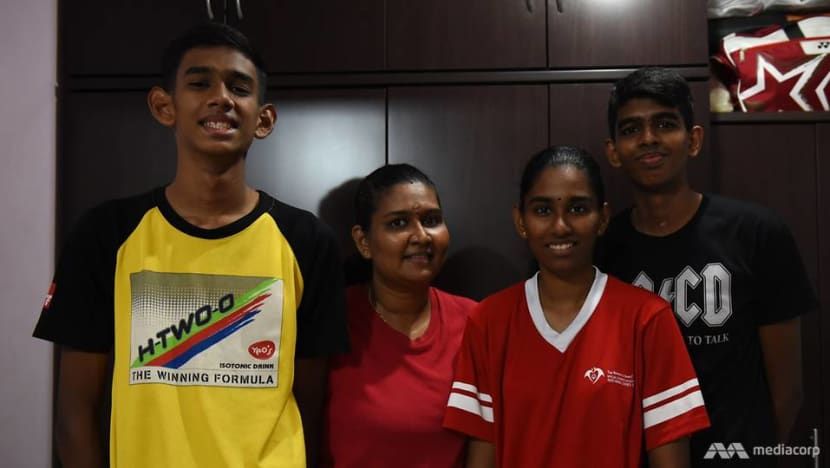
Likewise, Mdm Shankari pointed out that she did not have the "slightest disappointment" when her third child Shaman was found to also have mild intellectual disability.
"I managed to make adjustments earlier," she said. "Immediately at the end of Primary 3, I transferred him to Grace Orchard.
"I didn’t have the slightest disappointment because I was already at that stage (with Priyadashani) and I had started to explore. I had been asking around and got a lot of info from her teacher."
While acceptance of their children's conditions was a crucial first step, both Mdm Rosmawati and Mdm Shankari note that they have had to use different methods of teaching to help their kids.
"To make them understand, I have to repeat and repeat and repeat," said Mdm Rosmawati. "For my kids, since they are slow in learning, you need to teach them step by step.
"They cannot take in three or four instructions - it is two at most."
Mdm Rosmawati, who is the head of the parent support group at Delta Senior School, also meets up with her children's teachers to better understand their methods, so she is equipped to help her kids.
"I can't teach them as I would with a mainstream child," added Mdm Shankari. "I taught them maths with coloured ice-cream sticks ... to make them interested and understand, I had to make use of colours."
When it comes to teaching the English language, using phonics is Mdm Shankari's preferred method of instruction.
"It takes a long time for them to understand," she explained. "Initially Priya had this problem where she would take a week to understand, memorise and spell a word."
READ: Grit and a whole lot of love - When single fathers rise to the challenge
THE POWER OF SPORT
Sports also played a key role in their children's' development, both mothers said.
Priyadashani and Shaman for instance, are both track and field athletes who most recently represented Singapore at the Special Olympics World Games in Abu Dhabi.
Priyadashani finished with a bronze in the 400m F3 division race, while brother Shaman clinched a silver in his 400m event.
"They have difficulties in studies and other things but definitely sports has helped them a lot - to make them focused and disciplined," said their mother.
Mdm Shankari tries to be present at their training sessions - to provide moral support and to spur them on.
"As a single mom, I have to handle them both in academics and encourage them in sports and their personal life as well," she said. "It's been a challenging journey but I have no regrets."
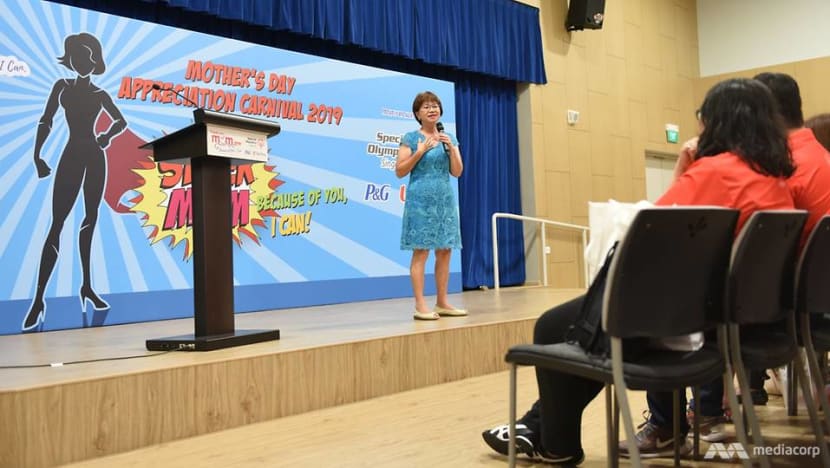
In a glass cabinet tucked in the corner of the Sengkang flat Mdm Rosmawati shares with her three children, husband and mother, stand proud momentos of her children's sporting prowess.
Nurhamizah and Hakim are bowlers, while Nurhazimah is both a track and field athlete as well as a floorballer.
Their mother is ever-present at training sessions, while their father shuttles them around coaching on the weekends.
"I'm happy to be there, so I can see whether I’m doing a good job in how they control their emption, how they take their responsibility and discipline seriously," said Mdm Rosmawati.
"The mums of the special athletes I’ve seen are special themselves - many of them showed the grit to move on despite the challenges," president of the Autism Resource Centre (Singapore) Denise Phua told CNA. "They do their very best to develop their children to the extent that their talents are so developed that they are now representing Singapore.
"They are in a league of their own. Even when they sometimes struggle, they are able to stand up, stand out and stand tall. To them I give my highest salute and respect,” said Ms Phua, who is also Member of Parliament for Jalan Besar GRC.
At the recent Special Olympics World Games, Nurhamizah clinched Singapore's first bowling medal, a silver.
Recalling the moment of her daughter’s triumph, Mdm Rosmawati’s eyes well up and her lower lip trembles.
“She had asked me: 'Ibu (mother), why are you crying?” she said.
“I said these are tears of joy ... During the competition, I saw her interacting and making friends with other athletes,” said Mdm Rosmawati. “I always tell my kids when you go for a competition, it’s not about your score or timing that makes us proud, it's about your behaviour."
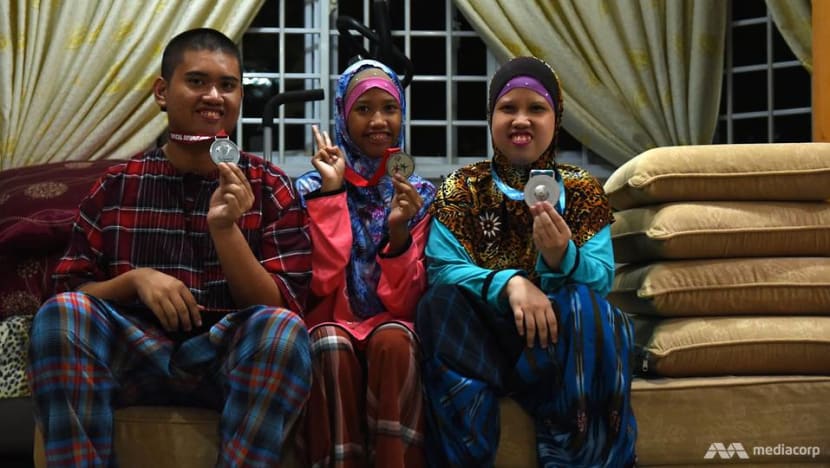
Two days later at the Khalifa Bowling Centre, Nurhamizah clinched another medal, a bronze.
Again, there was some crying.
"My husband didn't cry but I knew from his face he was touched too,” recalled Mdm Rosmawati with a laugh. "By her just being at the Games, it's like I passed the test. I did it! It wasn’t just about the medal."
Standing on the podium, the same girl once rejected, ignored, and misunderstood became a winner in the eyes of the world.
But to her mother, she always was.












